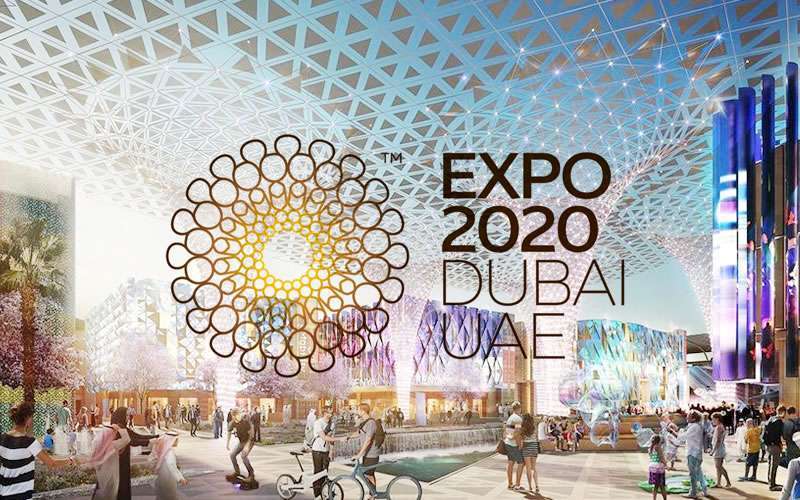By James Ogul and Judith Rubin
The Bureau International des Expositions (BIE) will convene April 21, 2020 for a virtual meeting of its Executive Committee to discuss a change of dates for Expo 2020 Dubai, a six-month world’s fair that had been set to open October 20. Expo 2020 represents a $7 billion investment with nearly 200 international participants and projected attendance of 25 million visits, 70% of those from overseas.
A one-year delay of a world expo is unusual. Here, we give some background and address some aspects of what such a delay could mean.
The decision process
To officially finalize such a decision will require the ratification of a two-thirds majority vote of BIE Member States as stipulated by Article 28 of the 1928 Paris Convention. Quoted in The National (an English-language news service in the Middle East) Reem Al Hashimy, Director General of Expo 2020 Dubai, stated, “While they remain firmly committed to Expo 2020, many countries have been significantly impacted by Covid-19 and they have therefore expressed a need to postpone the opening of Expo 2020 Dubai by one year, to enable them to overcome this challenge.”
The BIE is the Paris-based, international organization that regulates world expositions or world’s fairs. The BIE executive committee consists of delegates of 12 elected BIE Member States as well as the Secretary General of the BIE, Dimitri Kerkentzes. Members of the Committee will discuss the request of the Government of the United Arab Emirates to postpone the Expo for nearly a year, with the new dates being October 1, 2021 to March 31, 2022. The request of the UAE Government was sent following discussions by the Expo 2020 Dubai Steering Committee with the Expo Organizer and the BIE on the impact of the Covid-19 pandemic.
As far as precedents go, there were some reshufflings in the 1990s: Seville Expo 92 had originally been part of a BIE-approved, two-city expo scheme including Chicago. Chicago 1992 would have been the first world’s fair hosted in the US since the 1984 Louisiana World Exposition in New Orleans – but was canceled due to lack of support from the State of Illinois and the City of Chicago. A subsequent two-city expo, Vienna-Budapest 1995, became just Budapest 1996, and then Budapest canceled, due to funding difficulties. A non-BIE event, the World City Expo in Tokyo, was canceled as well.
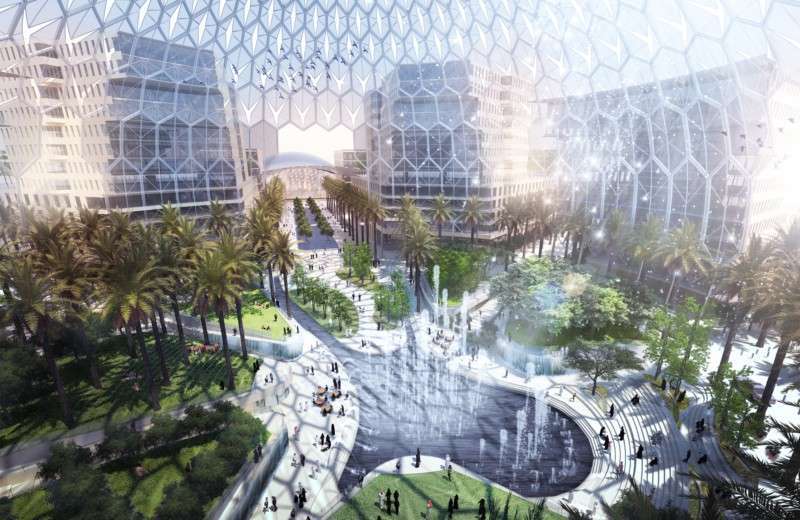
Rendering of Al Wasl Plaza, Expo 2020 Dubai
Construction and logistics
Each Dubai 2020 participant – and the organizers themselves – will face unique challenges and opportunities with a one-year delay.
The extra time may be useful to countries that got a late start in planning and producing their pavilions, but there are potential complications as well. At the present time, in addition to the direct health risks of working on the expo grounds, there are shipping logistics and supply chain problems.
When will it be safe to resume construction work? Contracts will have to be extended and some terminated if companies cannot commit to the extended time frame, including some that already have received payment for goods or services. Costs may go up if there are fewer vendors available a year from now. Buildings that are largely finished will be sitting idle for months and may suffer some deterioration.
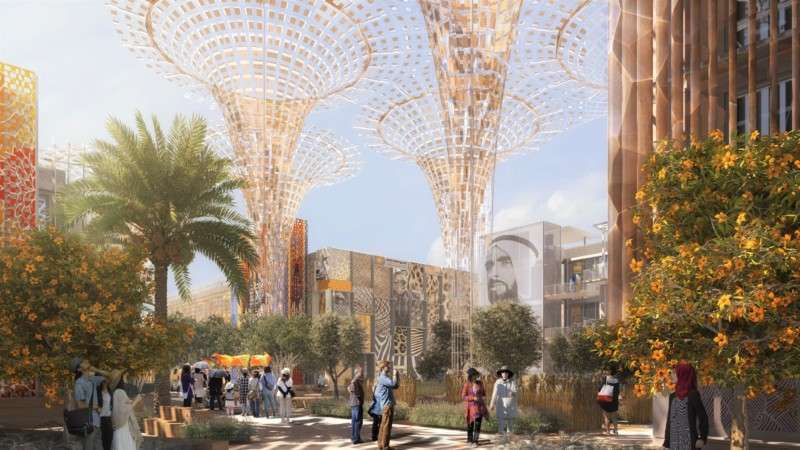
Rendering of Expo 2020 Dubai thematic district
Design and operations
Might this public health crisis dictate the need to change design and operations parameters in ways that could affect the nature of the event?
World’s fairs draw crowds of people who wait in queues to visit exhibits and theaters inside buildings, who gather in large public spaces for performances, parades and spectacles, who consume food, buy merchandise, use restroom facilities, share public benches, ride transit, use touchscreens and kiosks. There may be a need to review such things as throughput, visitor flow, crowd size, sanitation, food service and touchpoints in general. All of this could have a ripple effect and could change individual aspects of design and the design day overall.
Participating countries will also have to consider what to do about operational staffs, personnel contracts and payroll for their respective pavilions. The delay also extends the fundraising window, but what will the fundraising environment be like?
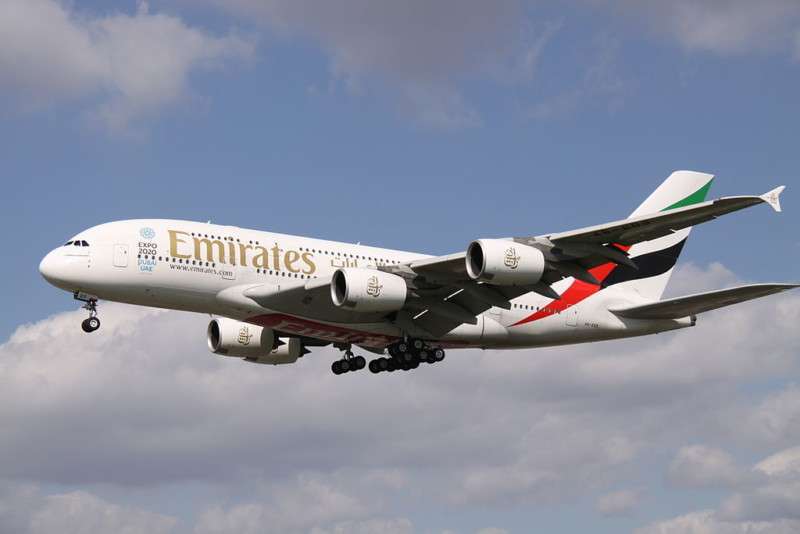
Emirates plane with Expo 2020 logo
Attendance and travel
The Dubai 2020 attendance model, projecting 70% of visits from overseas, is essentially a reverse of past models. This reflects market realities for Dubai and is an untested model for expos; however, the Dubai 2020 organization has from the start shown itself to be enterprising and innovative.
[See InPark articles “Expo 2020 Dubai forecasts 70% attendance from abroad – Can they do it?” and [“Dubai 2020: The tourist destination.”]
When those projections were developed, however, COVID-19 was an unknown as were its effects on world travel and the travel industry and infrastructure. Will things have sufficiently recovered by October 2021?
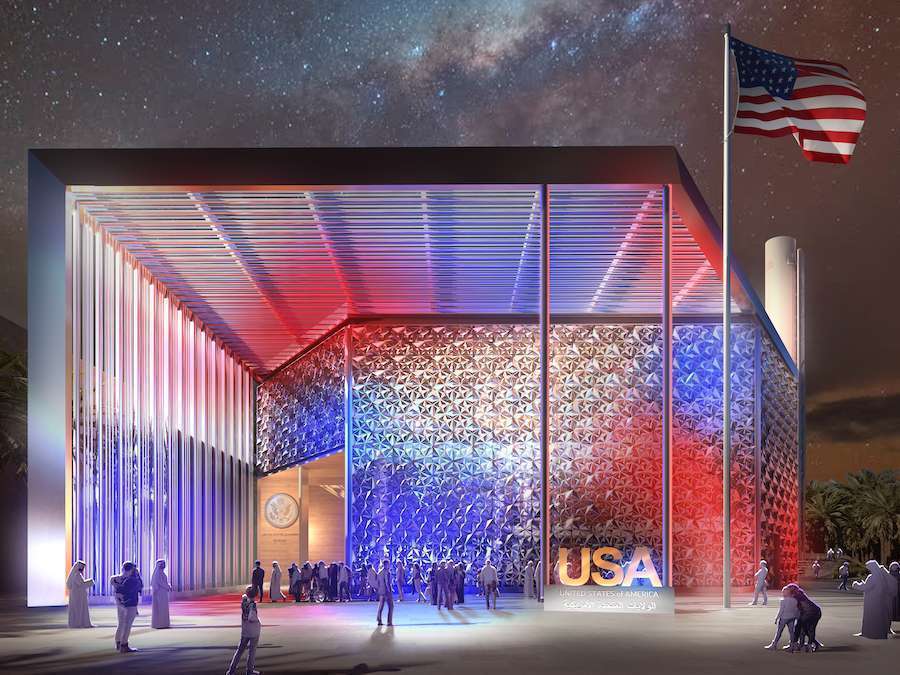
Rendering of USA Pavilion, Expo 2020 Dubai
U.S. participation
United States participation in Dubai 2020 hung in the balance for some time due to complicated government regulations that make it difficult to fund US participation in world expos. A resolution came as recently as January 2020 with the announcement that the Emirati government would fund the US pavilion at Dubai.
If there is a change in administrations in the US in the intervening time, the pavilion content may have to be revised to reflect the policies of the new administration. There are also questions as to whether any ongoing sponsorship initiatives may be affected, and if in the new conditions, the provided funding will be enough.
Relevance and content
Finally, there’s the question of relevance. The Dubai 2020 theme, “Connecting Minds, Creating the Future,” is broad enough, but how it is addressed in individual exhibits may in some cases lose relevance due to the changes brought by the pandemic. There may be many instances in which content will need to be updated to reflect changed conditions and expectations.
All of these challenges can be seen as opportunities – grand opportunities of the kind that a world’s fair should and must embrace. We hope to see the Dubai Expo do what world expos were created to do – bring the world together for meaningful and useful dialogue and give us a glimpse of – and tools for – a better future. It will also provide inspiration and examples for the hosts of the next world’s fair. Based on their accomplishments and vision statements so far, we believe that Dubai 2021 is up to the task.
James Ogul is world’s fair editor of InPark and spent his career administering world’s fair pavilions for the US Government. Read his free online book, Tales from the Expo
Judith Rubin is Editor of InPark and one of her specializations is world’s fairs. She spent nearly a decade with World’s Fair magazine (published by the late Alfred Heller).


